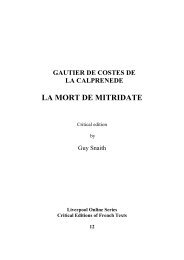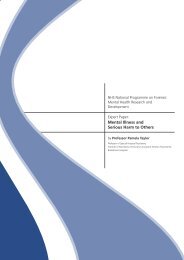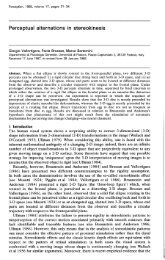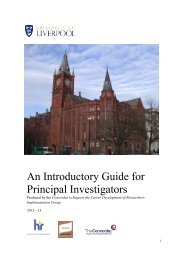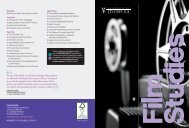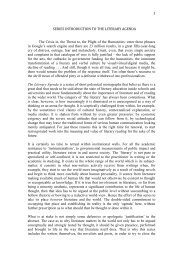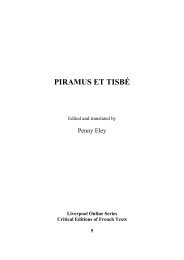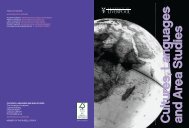LA MORT DE MITRIDATE - University of Liverpool
LA MORT DE MITRIDATE - University of Liverpool
LA MORT DE MITRIDATE - University of Liverpool
Create successful ePaper yourself
Turn your PDF publications into a flip-book with our unique Google optimized e-Paper software.
La Mort de Mitridate<br />
including, ultimately, his own (ll. 155, 1031, 1277, 1340, 1546, 1720). The theme<br />
<strong>of</strong> méconnaissance runs throughout the play, as characters no longer recognize<br />
people they have known and loved. The interview between Pharnace and Bérénice<br />
begins with husband and wife tossing the term backward and forward between<br />
them. The baroque topos <strong>of</strong> appearance versus reality comes into play as well as<br />
Bérénice points out the difference between Pharnace’s physical appearance: ‘le<br />
mesme’ (III.3.810) and the reality <strong>of</strong> the ‘honteux changement’ (l. 808) to his<br />
character. The shock for Pharnace is his wife’s changed behaviour, which<br />
contrasts with Pharnace’s use <strong>of</strong> the vocabulary <strong>of</strong> immutability earlier in the play<br />
to describe Bérénice’s love for him: ‘une amour semblable’ (II.4.538), ‘mesme<br />
feu’ (l. 539), ‘elle souffroit de mesme’ (l. 541), ‘reciproquement’ (l. 542), ‘une<br />
immuable foy’ (l. 547). There is irony when at the end <strong>of</strong> the scene together the<br />
protean Pharnace declares his unchangeability: ‘…il n’est rien d’assez fort pour<br />
me faire changer’ (III.3.984). He thus incarnates other aspects <strong>of</strong> the baroque to<br />
those <strong>of</strong> his father.<br />
Pharnace is also more interesting as a character because he is torn by<br />
psychological conflicts which provide him with a dilemma. Although he is able<br />
for the most part to suppress his conflicting emotions with a little help from the<br />
Romans, it is important for the development <strong>of</strong> the play that the possibility exist<br />
that he may be won back over to the side <strong>of</strong> his wife and father and family. For<br />
the audience to believe that such a turn <strong>of</strong> events is possible, Pharnace needs to be<br />
a conflicted soul. Otherwise, the two central interviews with his wife (III.3) and<br />
father (IV.3) will never have the power to persuade an audience that the direction<br />
<strong>of</strong> the play may change, and any attempts at suspense on the dramatist’s part will<br />
be undermined as a consequence. In Act II, scene 4, therefore, he is humanized.<br />
Pompée having left and not yet bullied by Émile, Pharnace starts to reveal cracks<br />
in his façade <strong>of</strong> unflinching loyalty to Rome. The fate <strong>of</strong> his father moves him to<br />
declarations such as: ‘Mais dieux de quels remords je me sens agiter! / Quel tardif<br />
repentir me vient persecuter!’ (ll. 479-80); ‘J’ay pour plus grand fleau ma seule<br />
conscience’ (l. 489). His love for his wife is an even greater source <strong>of</strong> disquiet and<br />
doubt as he confesses to Émile: ‘Sçache que ma douleur ne vient plus que<br />
d’amour’ (l. 523), ‘Que cette passion engendre tous mes soins’ (l. 528). La<br />
Calprenède also precedes Pharnace’s interview with his father with a scene in<br />
which the son reveals residual filial feelings: ‘Mais que mon cœur pressé de<br />
divers mouvemens, / Garde, avec regret, ses premiers sentimens’ (IV.2.1095-96).<br />
Indeed, the play only works if we believe Pharnace can be moved sufficiently, and<br />
since that is reliant on the conquest <strong>of</strong> weakness and persuading him to seek selfpreservation<br />
with Mitridate’s side, we, like Christopher Gossip, might not believe<br />
he can be moved sufficiently, even if such conflicting emotions are meant to<br />
provide a dilemma for Pharnace, a situation which the Romans fear enough for<br />
them to keep him under constant surveillance. 99<br />
99 Gossip writes: ‘This unattractive personality is not explored in any depth: passing<br />
expressions <strong>of</strong> guilt and regret are forgotten in an overriding concern for selfpreservation<br />
which leaves no room for any lasting doubt in him or any true pity in us’,<br />
32




